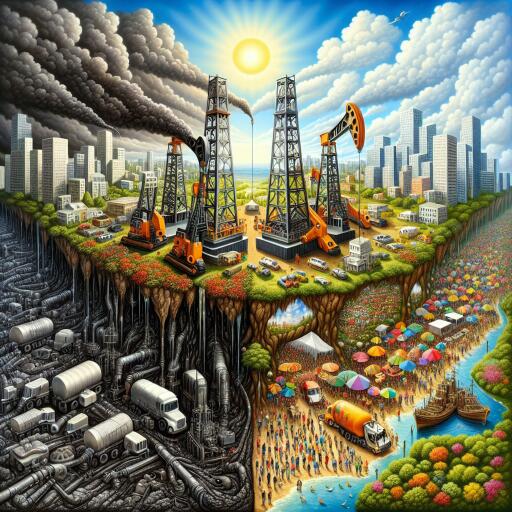
Big Oil and Civilization Don’t Mix: A Dire Warning for Our Planet’s Future
In the shadows of our advances, the signature of our era is not just the marvels of technology but the shadow we cast on our planet through the relentless burning of fossil fuels. The escalating levels of carbon dioxide (CO2) in our atmosphere paint a grim picture of the future: from 400 parts per million in 2010 to a staggering 425 parts per million today. These aren’t just numbers—they’re a wakeup call to the urgency of the climate crisis we face.
A profound exploration of this crisis was echoed in the poignant documentary, The Oil Machine. It stands as a testament to the historical and ongoing complicity of the oil industry in the climate conundrum. Through its narrative, we witness the vast and perilous operations that drill into the heart of the Earth, extracting the very essence that fuels our civilization but also threatens its very foundation.
The Ignored Warnings
Scepticism towards the effects of fossil fuels on our climate is not a recent phenomenon. Even in the 1970s, scientists, including those from the ranks of Exxon Mobil, voiced concerns about the dire consequences of unchecked fossil fuel consumption. Ironically, while acknowledging the harmful impact on the planet’s climate, Exxon Mobil retreated from this path of research, prioritizing profit over the planet’s health.
The turning point in the climate change discourse came with James Hansen’s address to the Senate in 1988, firmly establishing the link between fossil fuel burning and the greenhouse effect. Yet, despite the mounting evidence and the urgent calls to action from the scientific community, the next few decades saw little to no significant shift away from fossil fuel dependency.
The Stakes for Civilization
The Oil Machine not only exposes the technological feats of oil extraction but also delves into the catastrophic repercussions of our dependency on oil. From the ominous visuals of titanic machinery ravaging the seas to extract oil, to the unsettling predictions of mass climate-induced migrations, the documentary paints a harrowing picture of a civilization on the brink.
Climatic aberrations such as flooding, rising sea levels, heatwaves, and droughts are not distant possibilities but present realities. These erratic weather events herald a grim forecast for ecosystems and human societies alike, with populations such as Bangladesh already facing existential threats.
A Call to Action
The ominous outlook for humanity was succinctly summarized by Sir David King, who stressed that our actions in the next five years would set the course for the next millennium. Yet, the needed drastic reduction in fossil fuel use remains a distant goal, with major polluters expanding their oil drilling ventures instead of curtailing them.
The documentary shines a light on the uncomfortable truth about the omnipresence of oil in our lives, from the food we eat to the vehicles we use and the myriad plastic products we consume daily. The challenge is monumental, but the alternative—a planet rendered uninhabitable by our own hands—is unthinkable.
Moving Forward
The pathway out of this crisis requires a concerted effort from every sector of society. We must champion renewable energy sources, advocate for comprehensive public transport systems, and support policies aimed at reducing our carbon footprint. From installing solar panels across our buildings to imposing stringent penalties on excessive fossil fuel use, the measures are clear and within reach.
The discourse on climate change is ultimately a dialogue on the kind of future we wish to bequeath to the coming generations. Do we continue down the path of destruction, or do we pivot towards a sustainable model that respects the delicate balance of our planet’s ecosystem? The choices we make today will determine the fate of our civilization for millennia to come.
It is incumbent upon us, both young and old, to reject the siren call of fossil fuel dependency and forge a new path forward. A path that leads away from the precipice of climate catastrophe towards a sustainable and vibrant future for all inhabitants of Earth.





Leave a Reply